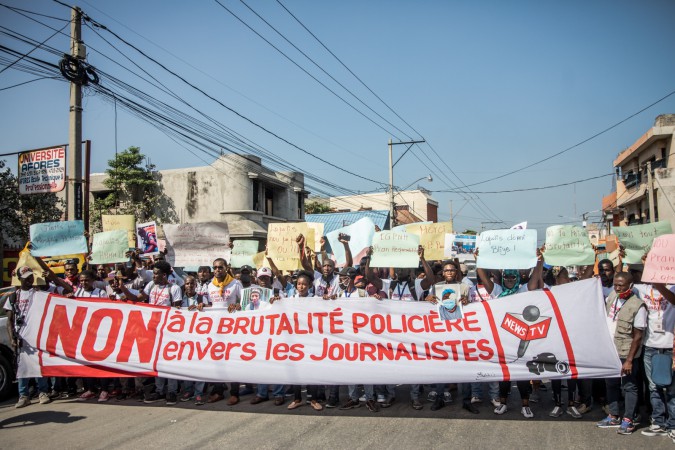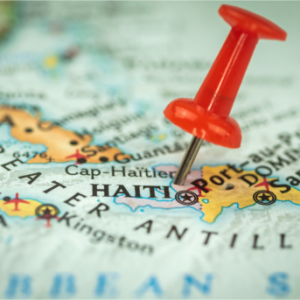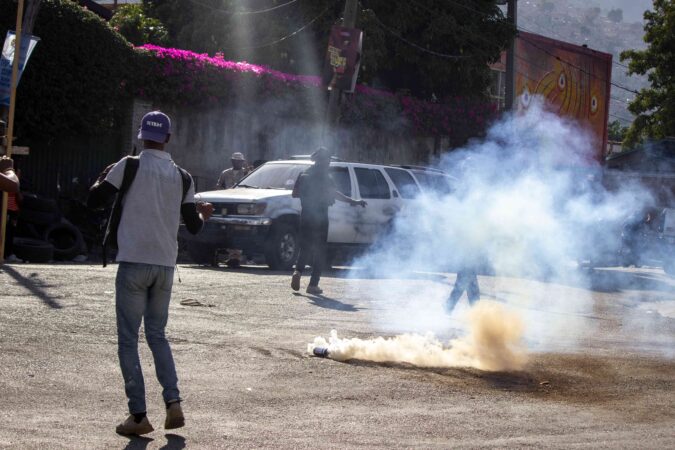The impunity enjoyed by Haitian police officers since the establishment of the institution in 1995 raises questions about the accountability of the actions of the future 2,500-member multinational force
Filing a complaint after police violence achieves practically nothing in Haiti.
This conclusion comes from interviews conducted with ten victims who sought legal recourse after being attacked over the last decade, as well as the analysis of three human rights defenders.
Testimonies collected by AyiboPost suggest a climate of almost total impunity within the Haitian National Police (PNH), at a time when an armed force must come to help fight gangs.
The rules of engagement for the multinational force, to be led by Kenya, are not known.
Nothing indicates whether foreign agents will be able to appear before Haitian justice or before courts outside the country.
But the impunity that Haitian police officers have enjoyed since the creation of the institution in 1995 raises questions about the accountability of the actions of the future 2,500-member multinational force.
The rules of engagement for the multinational force, to be led by Kenya, are not known.
“We must address the question of the responsibility of the members of this force as soon as possible in order to prevent the same errors from happening again,” says Wilkenson Jean-Denis, head of legal affairs at Défenseurs Plus.
Jean-Denis refers to multiple cases of human rights violations committed by foreign soldiers in the country during previous missions, including that of the United Nations which introduced cholera into the country in 2010.
Read also: The UN refuses to assist children abandoned by MINUSTAH soldiers
In 2023, Défenseur Plus alone had recorded around sixty cases of violence committed by police officers.
The human rights organization supports most victims in their legal proceedings, but none have been successful to date.
The police — formally called the General Inspectorate of the PNH (IGPNH) — very rarely punishes the offending officers.
The justice system, rendered dysfunctional due to repeated strikes, lack of resources and insecurity, often takes several years before rendering a decision.
Added to this, the vast majority of Haitian police officers do not wear any visible number or symbol allowing them to be identified individually, making any attempt at legal prosecution laborious.
“This disconcerting impunity makes violent police officers more comfortable in their misdeeds,” analyzes Wilkenson Jean-Denis.
The question of the responsibility of the members of this force must be addressed as soon as possible in order to prevent the same mistakes from happening again.
– Wilkenson Jean-Denis
However, police violence kills.
Sometimes slowly. As in February 2015, around the Court of Cassation and Administrative Disputes (CSCCA) on avenue Christophe.
On the sidelines of a demonstration by students denouncing the rise in prices of petroleum products in front of the CSCCA, Chedelet Guilloux, an artist and philosophy student, will be apprehended by police officers.
Without proof, according to his comrades, Guilloux is accused by agents of having set fire to a bus belonging to the Court.
The accusation led to a sentence: Guilloux was violently beaten and thrown into a prison cell at Croix-des-Bouquets, where police officers amputated his “dreadlocks” without his consent.
He will eventually be released, never able to regain his previous health.
After years of pain, chronic headaches and abscesses, Guilloux died within the walls of a hospital in Les Cayes in March 2024.
His long-time friend, Fresner Michel, as well as those close to him, hold the police responsible for his death.
But bitterness does not only accompany death slowly.
According to Michel, no action has been taken on the complaint filed against the perpetrators of the violence almost a decade later.
Watch this AyiboPost report published in May 2024, following the death of cultural activist Chedelet Guilloux in March, around nine years after being arrested and manhandled by police:
Often, death comes immediately.
This was the case in October 2022, when journalist Romelson Vilcin deceased after being hit in the head by a tear gas bomb thrown by a police officer in the premises of the Delmas 33 police station.
According to testimonies from the time published in the press, the journalist from Radio Génération 2000 was part of a group of reporters who went to support their colleague Robest Dimanche, himself arrested during a demonstration.
Journalists are generally at the forefront of victims.
Read also: For the Haitian journalist, the violence comes first from the police
In a rapport released in April 2024, the National Network for the Defense of Human Rights (RNDDH) reveals that between February and March, at least nine popular demonstrations were violently repressed by the police on the national territory.
This wave of repression resulted in the death of at least four people and around fifteen injured, including eight journalists.
The reporter for the online platform Vant Bèf Info Pierre Daniel Lamartinière found himself on the list of victims of police violence twice in less than three years.
In 2021, he had lost his left eye after receiving a rubber projectile fired by a police officer during an anti-government demonstration at the airport Carrefour.
In February 2024, Lamartinière — also an employee of state television — was hit by an agent of the departmental law enforcement unit near the premises of the prime minister’s office, in Delmas 60.
In both cases, no legal action was taken to establish his rights.
“It’s not easy to go through this,” Lamartinière confides to AyiboPost. “But I deal with it, because it’s part of the risks of the job.”
Read also: This journalist was shot in the eye. He returns to the charge.
In the South, in October 2019, journalist Jacquelin François almost died.
As he was preparing to cover an anti-government demonstration in Les Cayes, four police officers forcibly detained him and hit him in the abdomen. “I still feel pain at times,” complains the professional.
In the north of the country, Love-Mackendy Paul, journalist and reporter at Radio Tropikal in Cap-Haïtien, was the victim of brutality at the hands of agents of the Bureau for the Fight against Drug Trafficking (BLTS), on the sidelines of the drug movements. protests in February 2024.
One of the police officers damaged the professional’s equipment after pointing his weapon in his direction. Despite complaints, no follow-up is given.
The police — formally called the General Inspectorate of the PNH (IGPNH) — very rarely punishes the offending officers.
THE police violence designate any use made by the police of their force outside the frameworks established in the exercise of their functions.
In several countries around the world, including Brazil, France and the United States, police violence is a major concern.
According to the Statista website, the Brazilian police will be the most violent in the world in 2022 with nearly 6,000 homicides on his account.
In Haiti, according to specialists contacted by AyiboPost, police violence particularly intensifies during periods of popular demonstrations.
In 2022 and 2023, dozens of victims have been recorded in protest movements by subcontracting workers.
Read also: Police officers kill his son. The Haitian state pays one million gourdes.
Télémaque Pierre, general coordinator of the Textile and Clothing Workers Union (Sota) says he was personally the victim of police brutality on several occasions during what he describes as “black days”.
“We have the impression that the agents do not master the means at their disposal,” notes Pierre, denouncing the abusive use of tear gas and real projectiles against peaceful demonstrators.
PNH agents fired tear gas to disperse demonstrators protesting against the progress of pre-carnival festivities in Pétion-Ville, Sunday February 4, 2024. | © Jean Feguens Regala/AyiboPost
The arrival of the multinational force worries the trade unionist.
“We know that the Kenyan police have a reputation for violence. We are therefore very concerned about the human rights violations that they may commit,” worries Télémaque Pierre.
Even influential citizens cannot force the accountability of guilty police officers.
In February 2024, the commissioner of the interim government of Cap-Haïtien, Me Charles Édouard Durand, was publicly attacked by police officers from the Law Enforcement Unit (UDMO) because of a problem of “inappropriate parking” .
In April 2024, according to the person concerned, the file was still at the investigation stage before its possible transmission to the courts.
We know that the Kenyan police have a reputation for violence. We are therefore very concerned about the human rights violations that they may commit.
– Telemachus Pierre
Contacted by AyiboPost, a UDMO agent spoke of a lack of law enforcement training for certain agents deployed in the field. He also denounces “provocations by demonstrators” in a context where agents fighting gangs are not psychologically supported.
“Certain officers react very badly to crowd hostilities,” comments the police officer, for whom this explains regrettable slippages, particularly during demonstrations.
Impunity makes citizens suspicious of the police institution.
In Petite-Rivière de l’Artibonite, Dordly Michel was still sixteen years old when he was attacked by police officers on September 28, 2016.
After being “for no reason” hit in the chest by an agent, according to him, the geography student at the State University of Haiti (UEH) claims to “no longer have confidence in the police.”
Read also: One blunder too many: the PNH must clean up its ranks!
This problem of violence was also present from the creation of the police.
In January 1997, a rapport published by Human Rights Watch had mentioned cases of human rights violations committed by the police — who had taken in former soldiers, known for cases of human rights violations.
About forty people o were killed, according to the NGO, evoking at that time the need for judicial and administrative authorities to strengthen the training of agents.

In 2021, journalists organize a march to denounce and protest police brutality against them in Haiti. | © Valerie Baeriswyl/AyiboPost
For its part, in April 2005, Amnesty International highlighted the need for Haitian justice to crack down on those responsible violence that occurred in Bourdon against pro-Lavalas demonstrators.
A dozen people were then killed by police forces.
Read also: PNH brutality: Amnesty International reveals its methodology to Ayibopost
Nearly twenty years later, the situation is just as worrying.
Despite the evidence, including videos, photos and testimonies provided by the victims, “the general inspection does not show the desire to identify and punish the attackers”, analyzes Rosy Auguste Ducéna, program manager at RNDDH.
“Since we have been working on this phenomenon,” continues the activist, “we have not had any example of a legal action resulting in any conviction. »
Par Wethzer Piercin et Jérôme Wendy Norestyl
Jabin Pontus contributed to this report.
Cover image: Police violence in Haiti against fleeing protesters in 2019. | © Valerie Baeriswyl/AyiboPost
Keep in touch with AyiboPost via:
► Our channel Telegram : Click here
► Our Channel WhatsApp : Click here
► Our Community WhatsApp : Click here





